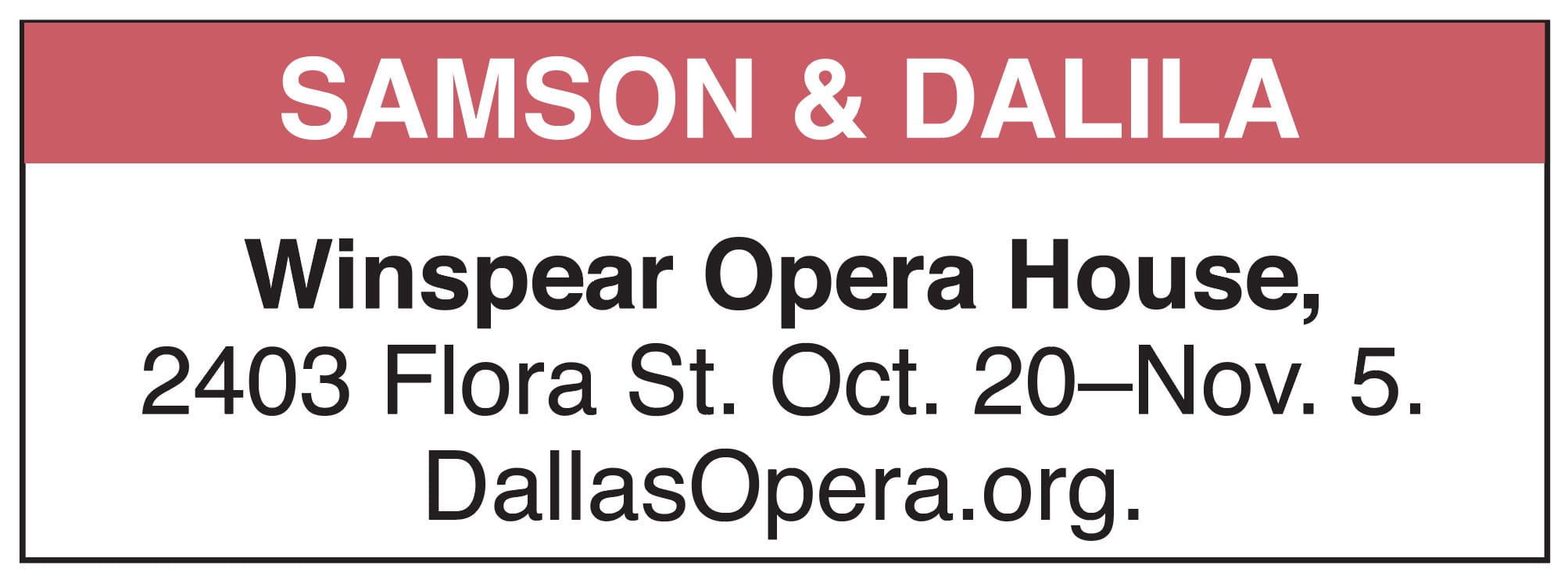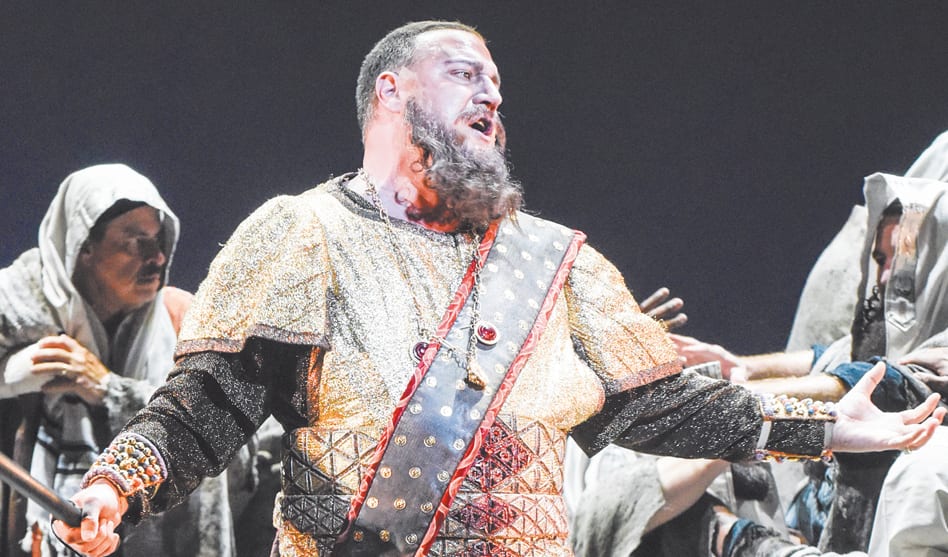Michael Chioldi took on the role of Abimelech — ‘who has one aria and dies’ — for the chance to make his Dallas Opera debut. (Photo courtesy Karen Almond/Dallas Opera)
Out baritone Michael Chioldi makes his Dallas Opera debut — just another step following his philosophy of carpe diem
ARNOLD WAYNE JONES | Executive Editor
jones@dallasvoice.com
 Michael Chioldi can barely remember a time before he loved to ham it up onstage. But becoming an operatic baritone? Well, that took a while longer to realize.
Michael Chioldi can barely remember a time before he loved to ham it up onstage. But becoming an operatic baritone? Well, that took a while longer to realize.
“I came to opera through acting,” the out singer says over a coffee inside the Winspear Opera House. He liked musical theater and light operetta roles. But it was his father who foresaw a serious future in opera.
“My dad said, ‘When your voice catches up with your acting, you’ll be a star,’” he recounts. Initially, the assessment stung the younger Chioldi as a criticism; now he sees it as a useful insight into a career arc that he jokingly assesses as imbuing him with the title King of the Middle.
Baritones, you see, are “middles” in many ways — the mid-range between counter-tenor and tenor at the top and bass and basso-profundo at the bottom. They are often the villains, the heavies and the “best friends” in opera, not the leading man. And Chioldi concedes that while he doesn’t have the name recognition of, say, Paulo Szot (though he has been included in the Barihunks fan-boy blog), he works constantly in a variety of roles.
“I’ve spent many years working at big regional houses. I just feel very fortunate, very lucky,” he says.
Chioldi has been a staple in North Texas operas for a number of years now, with four or five local productions … all with the Fort Worth Opera, though. With Saint-Saens’ Samson & Dalila — which opens the Dallas Opera’s season this week — Chioldi marks his Dallas debut.
“It’s funny — sometimes you work for one company in a city and the other [company] doesn’t hire you. Opera is still one of those businesses where there’s a pecking order,” he says. Which is one reason by he took on the role of Abimelech in Samson. He just wrapped performing the larger role of the High Priest in another production, but accepted this part — “I have one aria in Act 1, then I die,” he jokes — for the chance to work with maestro Emmanuel Villaume and everyone else at the Winspear.
“I wanted to get to Dallas and sing my debut here,” he says. “I’d rather get onstage and in front of the Dallas Opera [artists and audiences] than to [worry about the size of the part].”
It’s all part of a journey that Chioldi has shepherded wisely, but with a sense of humor.
“When you work in the bigger companies, unless you’re a star, time is too precious so you have to be a quick study to fit in. But I had an opportunity for 10 years at [New York] City Opera to collaborate with directors and conductors.” That experience helped Chioldi explore and refine his craft… and also carve out a specific path.
He jokes that the career of a baritone is, “we all start with Papageno [in Mozart’s Magic Flute] and we end with Wotan [in Wagner’s Ring Cycle]. And back when I was thin and pretty, I did all the very light-baritone repertoire. But as my voice grew, I cultivated my [work with] Verdi, which I love.” (In 2013, the bicentennial year of Verdi’s birth, he debuted in five Verdi roles in a single season.)
“I love the Verdi repertoire because he loved baritones — I am convinced he was writing for himself through the baritone voice,” Chioldi says. Verdi even specialized in putting baritones in leading roles: The title characters in Macbeth and Rigoletto, and the juicy lead of Iago in Otello, among others. But he stresses, he’s more than content with his “middle” honorific; he has come to realize that he accomplishes more with his talent than he once imagined.
“About 10 years ago, I thought of myself, ‘I’m just a performer, just an entertainer,’ but I see it differently now,” he says. “I’ve met so many established and impressive people along the way. I’ve sung for Congress, and when these people come up and say, ‘Thank you — this let’s me do my job better,’ I realize, the arts are [more than entertainment] — they are the fabric of society.”
Chioldi shamelessly embraces the cliche that opera singers tend to be bigger, though he proudly stays fit while conceding he’s more bear than twink.
“I’ve tried to maintain my physical fitness — I’m still the most in-shape baritone for my class… and there’s no rotten mayonnaise in this hot face!” he winks about avoiding Botox. “Sometimes I’m a bit of an operatic pig, because I like the high notes. You know, you cook what you love to eat, and I have good high notes, so I go to my strengths. My timbre and color has gotten darker but the tone is still high. I’m right in the meat of my vocal prowess. I’m having a big second act.”
That second act is more than just career highlights; less than a year ago, he and his long-time partner wed in a blowout at Trinity Church on Wall Street and Broadway.
“We had a faaabbulous wedding,” Chioldi coos. “It was wall-to-wall with the Who’s Who of opera people and great friends and family. And, at least that day, he wasn’t King of the Middle — he was King of the World.

